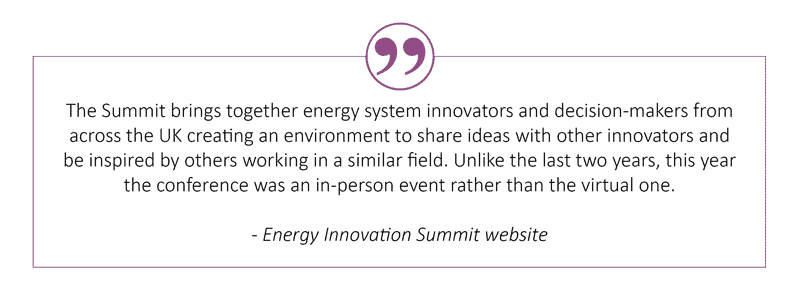
Shahab Khan
Energy Innovation Summit
The 2022 Energy Innovation Summit, previously known as the Energy Networks Innovation Conference (ENIC) was rebranded “The Summit” as part of a new collaboration with The UK’s Department for Business, Energy & Industrial Strategy (BEIS), Innovate UK, Ofgem and Regen, opening the UK’s leading energy innovation event up to the wider industry as well as attracting new domestic and international delegates.
 Program highlights
Program highlights
The conference brought energy professionals together to talk about lessons learned from over 60 UK innovation projects. The main themes of the conference were around the following points:
- Network Resilience: The disturbances happening on the system due to various reasons (bad weather, equipment failure, natural environment, etc.) have an impact on the system and present challenges to network resilience. Responses and lessons learned with respect to network resilience in light of recent storms (Storm Arwen) in the UK were presented along with resilience-led Innovation projects. Project Pre-Fix from National Grid Electricity Distribution (NGED), and Microresilience from Northern Power Grid were some of the projects presented related to improvement in network resilience. In the space of network resilience.
- Open Data and Digitalization: Poor quality data can lead to poor quality decisions, hence this puts the requirement of access to real-time high-quality data at the forefront. It was discussed how open data and digitization is becoming increasingly important to facilitate collaboration and innovation. Challenges and obstacles in the path of delivering open data were also discussed. Innovation projects presented, amongst others, in this space were Virtual Energy System by National Grid and QUEST by Electricity North West Ltd (ENWL).
- Flexibility and Demand: This session focused on how the demand side of the energy system could improve the efficiency of the network and drive down the costs of the whole system. It was discussed how consumers across commercial, industrial and domestic sectors can make the system more flexible. One of the projects presented was BitraDER by ENWL which addresses the challenges around the lack of competition, and the reluctance to accept flexible connections and offer flexible services. Results from SP Energy Networks’ (SPEN’s) Flexibility Demand Shift Trial were also presented. The results showed the capability of the domestic customers to flex their demand at times of high generation and thereby assisting in balancing the network.
Takeaways
Overall, The Summit was an opportunity to engage with like-minded people from across the UK energy sector, specifically electricity and gas energy network operators. We were able to interact in interesting sessions which focused on solutions for the energy transition, networks of the future and the challenges of a net zero future.

 Program highlights
Program highlights